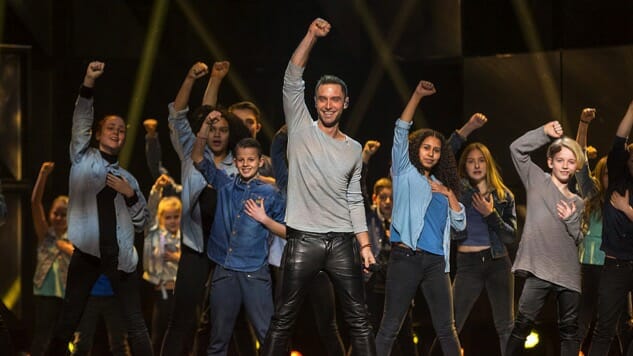But, oh yeah, lest we forget, it’s all about the music. Winners are determined by the audience, which votes via text message. (Sorry, you can’t vote for your own country, and anyone not in Europe or Australia is reduced to bystander status.) Because of this, over the years sweet, sappy, crowd-pleasing pop has typically dominated the competition. The Germans have a word for this style of music: “schlager.” But as this is an institution that brought us not only ABBA but Celine Dion (who won for Switzerland 1989), we’d like to suggest a linguistic upgrade: “uber schlager.” Surprisingly, for a program that’s aired across central Europe (and streamed by millions more online), the name of the game isn’t becoming a breakout star. Rather the focus is all about the honor of representing your nation, or whoever drafted you. (Memo to more daring countries looking to break the mold in 2016: my humming game is on point.) The majority of winners go on to notoriety only in their own country, if at all. One recent exception was 2006 winners Lordi, who rode the controversy surrounding their demon-costumed entry into international fame. (Rumors about the heavy-metal quintet included the belief that they were Satanists, and that they were spies sent from Russia to plunge their native Finland into chaos.)
Giving emerging musicians a spot on an international stage is all well and good—but it also brings up an interesting point. There’s no rule about who can participate in the competitions. If a nation’s honor is based on Eurovision rankings, what’s stopping them from bringing in a ringer? Could anyone stop Robyn from crushing the competition for Sweden? (If any song embodies the ethos of Eurovision, it’s “Dancing on My Own.”) Or, can you imagine a world where Daft Punk’s “Get Lucky” doesn’t snatch the title for France? Sure, any song entered has to be an original, unpublished composition. But c’mon musicians, you can write your next album while on tour. (Right?)
This Saturday is the Eurovision finals, where 10 countries will meet up in Stockholm, Sweden to duke it out for this year’s crown. Expect the bombast factor to be high. After all, highlights from last year’s included Sweden’s little stick man BFF, Austria setting a piano on fire (an act of moxie that tragically earned them zero points), and England’s attempt to update “Putting on the Ritz” with an EDM beat. Expect flames. Expect flamboyance. Pray that for no reason other than she was the most well-received winner in recent memory Conchita Wurst appears out of nowhere to help rescue us from the tyranny of good taste. This is Eurovision—anything can (and probably will) happen. Let the games begin.
